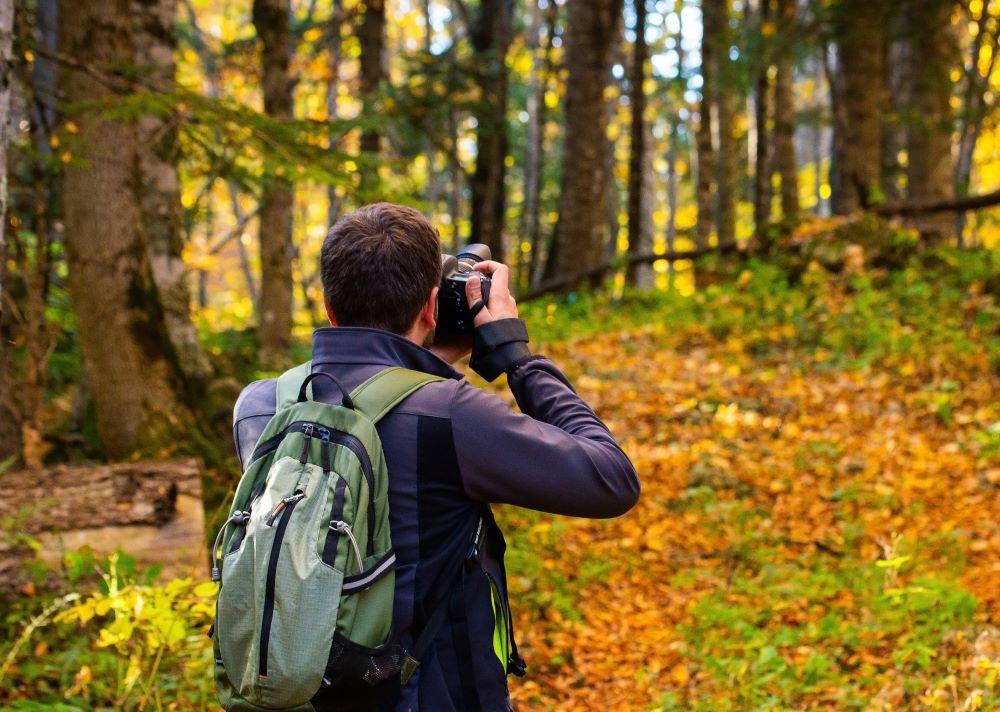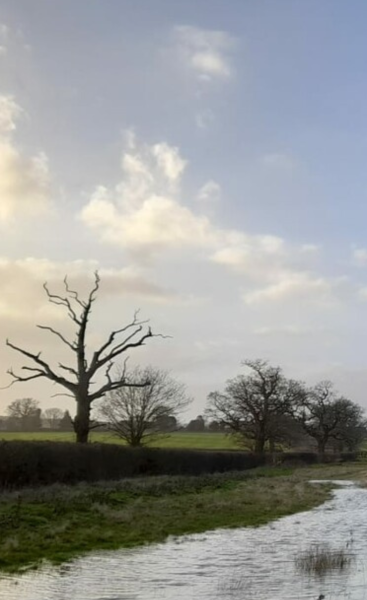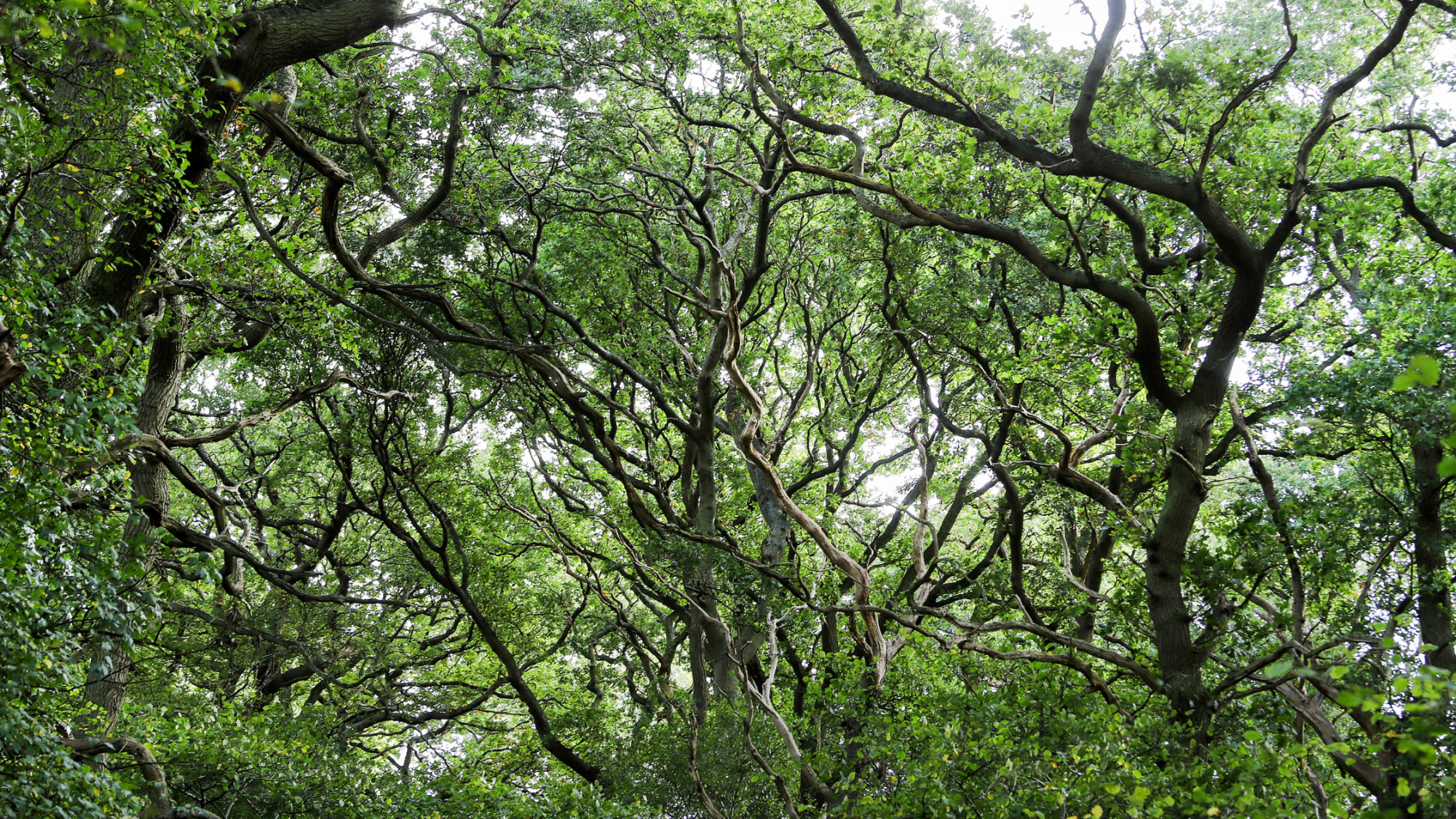
Environment and climate politics brings students to the Heart of England Forest
The Heart of England Forest offers Forest Learning programmes to schools and other educational establishments to support learning, enhance wellbeing and build students’ connection to nature. This recent visit from the University of Birmingham evidences the impact and benefits arising from their day in the Forest.
“Since the Forest trip, nature looks different, its non-uniform, it’s idiosyncratic, Environmental. In essence I learned how to connect with nature and how information about nature serves as an essential vehicle for connecting with it.” Francesca, Student.
Just as most final year students find themselves deeply embroiled in assignments, dissertations and revision, a group of students from Birmingham University studying Environment and Climate Politics immersed themselves in the Heart of England Forest for the day.
People’s experiences and interactions with the natural world
The Environment and Climate Politics course examines and explores the politics and practices of human interaction with the environment through case studies and theoretical debates. The subject matter is often tough and uncompromising, as it addresses some of the huge environmental challenges we face, and covers global, national, and international dimensions.
The students themselves come from different parts of the world and bring with them diverse experiences of nature and forests: some have grown up in huge cities like London and Hong Kong, and others come from the UK’s Home Counties or rural Spain.
Integrating the Forest into graduates learning
The aim of the teaching style of this course is to encourage students to think for themselves, and to analyse the realities of this incredibly challenging area. Co-convenor Dr Julie Gilson explained why she and Dr Emma Foster felt the Forest was such an important part of the course: “Sign-up was optional for students but, for those that joined us, the activities were designed to feed into a creative and self-reflective assignment linked to experiencing ‘nature'”. She added: “In our teaching we subscribe to the view that the catastrophic and unprecedented times we find ourselves in require us to look to creativity and new forms of storytelling across all disciplines. We chose the Forest as a space for the students to give them experience of an alternative learning environment, and through giving the students the space for creativity, imagination and new connections allow them to reflect on their own experiences and interests.”

An overview of the day
The group of students spent the morning with Andrea Duxbury, our Outdoor Learning Officer, exploring the Middle Spernal area of the Heart of England Forest, learning about the charity and its aims, and looking at the varied habitats. Practical activities such as water quality sampling of the ponds were carried out in different locations and a discussion was had about the data and its relation to the history and use of the sites.
Walking through the Forest enabled a discussion of the timeline of the Forest and the development of habitat and some of the complexities of managing and supporting them. Identifying some of the species using leaves, bark, and any blossom led to a discussion about the variability of species and the importance of provenance and the balance between key species across ecosystems. Water testing provided an important illustration of this balance. The ponds around the Windmill Hill end of Middle Spernal are all largely closed systems with no streams flowing into them, and in fact one is a season dewpond. 25% of the world does not have clean drinking water and here in the UK the contamination of our waterways is prominent in the public consciousness. Testing the water, we discussed the likely influences on water quality here and in the wider area, and the long-term effects of pollutants. The students asked many questions about how the Forest is managed, and considered how we measure the developing effects of change on different species.
In addition to learning about the Forest and our human relationship with it, we can’t underestimate the value of woodlands for the benefits they bring to human wellbeing. Many of the students expressed how important it was to spend time being quiet, looking, listening, and absorbing the Forest: 'Listening to the breeze and the birds gave me a new sensation of zen and had me rethink how small we humans are in a big world.' Anonymous, student
The day closed with a session led by Ian Dudley, doctoral researcher of Creative Writing and poet. The group immersed themselves in the ancient woodlands of Alne Wood and explored the art of crafting poetry as a way of reflecting on the environmental context, the woodland spaces and experiences of the day. This exercise contributed to the creative writing pieces many of them submitted as part of their final assignment.
During the trip to the Forest, each student made a different discovery. A student, from a community in the Ecuadorian rainforest, was fascinated and surprised by the 'lushness' of the Heart of England Forest.

Turned to marshes.
Imaginary serpents roam.
I wish I had wellies.
Deeper greens.
Less vibrant.
Duller reds and pinks.
Sad spring.
Castle walls.
Escaping vines.
Wysteria?
Imprisoned nature.
Distant treetops enjoying sunlight.
Unlucky field turned to bog.
Shadowy clouds.
Hiding the heavens.
Roald Dahl’s cloud-men.
Watching.
Sodden squelching.
Quicksand mud.
Sinking.
Willing me to stay.
Tall, wise oak.
Weathered many storms.
Comfort for the younger trees.
Rigid, solid; deep roots.

Feedback from the students
In a busy term, why did these students decide to do what many students hate to do: get up early to come out to the forest for an optional trip at the start of the Easter vacation, one week before the deadline for their final dissertation? More importantly, what, if anything, did they gain from the visit?
”The course is challenging and the chance to get out into the nature they have been studying is both engaging and thought-provoking.” Dr. J. Gilson, lecturer
“As an international student from Hong Kong I have never really been to a proper Forest habitat before. I hope to submerge into a true natural environment to help me rethink my relationship with the natural world and environmental politics” Thomas, Student.
Like Thomas, many students do not have a close affinity with nature, who are born in built up, busy areas.
Felix, away from his home territory of London in the middle of this novel space, noted that he has travelled to some amazing places but said in the creative work he produced that: “pure aesthetic judgement of one’s natural surroundings gives rise to feelings of care for these surroundings”. This echoes the work of Aldo Leopold, whose A Sand County Almanac (with its beautiful drawings too) is an important text for the course, and whose words Dr Julie Gilson used as the basis for the rationale for the trip: ”We can be ethical only in relation to something we can see, feel, understand, love, or otherwise have faith in”. For Felix, ”The Forest trip was a way of experiencing nature alongside all I had learned in Julie and Emma’s lectures and seminars”.
Alne Wood a muse
Alne Wood is a beautiful and reflective space and Ian Dudley shared a lovely piece of his own before guiding the group through writing exercises and finally sending the group to find a quiet space alone to reflect and write. Students were very clear that it had done so:
“The writing helped me reflect on why preserving nature is important.”
”Writing in nature was profound. I was able to detail sounds, smells and sights that otherwise I would not have noticed if I hadn’t been writing live from nature.”
“There is not much space for randomness or real creativity in undergraduate academia …it made me think differently and that was entirely fulfilling.”

Outdoor learning and the benefits
Lecturers Dr Julie Gilson and Dr Emma Foster are in no doubt about the benefits of the trip: ”Looking at the writing the students produced again this year and their responses to our questions, this immersion in nature has again been of huge value to them. They all engaged with the practical and then creative elements of the day producing some wonderful writing and thought-provoking points.
A number of the students themselves shared their intention to spend more time in nature and realised just how much time they had been spending indoors. The students were very reflective about their reasons for visiting a natural environment, for leaving their desks just as assignments piled in. They need it for themselves, for their wellbeing, to reconnect with nature. More than that, some came to reconnect their studies with the 'real natural world’.
Thomas, who has a particular interest in the relationship between economics and politics, reflected that he was now ”thinking more about sustainable development: how should we preserve natural spaces and the balance between urban and natural spaces.” The visit to the Forest was for some of the students a reconnection with the natural world and a breath of fresh air reviving their love for green space. And for Julie and Emma, that breath of fresh air is now integral to what, how, and where they teach.
Connections with nature to save the future
Birmingham University is currently collecting annual survey responses about the visit and have been profoundly impressed at the ways in which students have used the visit to deepen their reflections about their relationship with ‘nature’. Dr J. Gilson noted that students recognise the "importance of the natural world as a resource of quiet, calm, [and] rebalancing also comes up time and again with students who are under huge pressure as they enter their final term of their degree." Moreover, she adds, ”It's also important that they learn first hand about proactive environmental projects and the Heart of England Forest is an ideal location.”
Support future educational trips in the Forest
The Forest is a wonderful place for wildlife and people to visit. More so, it is important to recognise its value as a resource that evokes conversation and unleashes creativity in young people, to inspire future advocates to protect our natural world.
This is why it is more essential than ever to ask for your help with a donation, no matter the size of the contribution, you will be aiding the sustainability of the charity. Your donations will and always have been greatly received.



